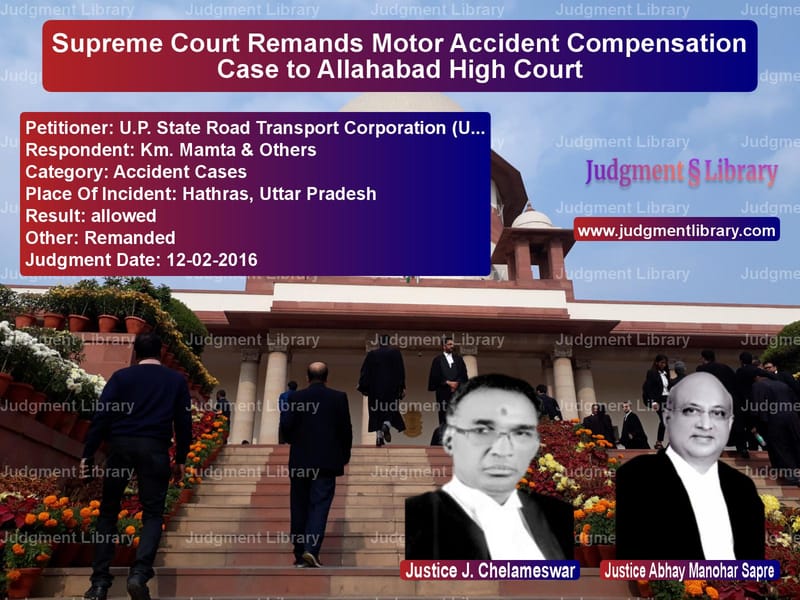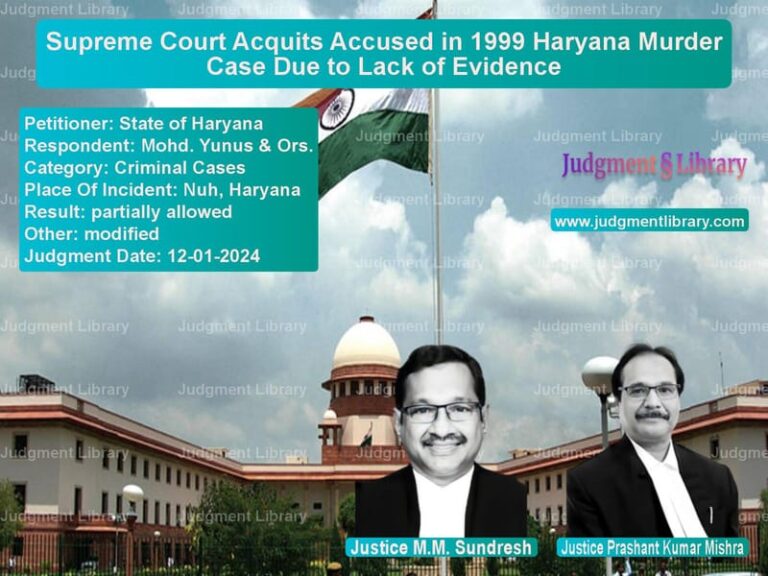Supreme Court Remands Motor Accident Compensation Case to Allahabad High Court
The case of U.P. State Road Transport Corporation (UPSRTC) vs. Km. Mamta & Others deals with a motor accident claim arising from the tragic death of Raj Kumar Gautam in a road accident. The Supreme Court examined whether the Allahabad High Court had properly discharged its duty as an appellate court while adjudicating on the award granted by the Motor Accident Claims Tribunal (MACT).
Background of the Case
The claimants, legal heirs of Raj Kumar Gautam, filed a claim under Sections 140 and 166 of the Motor Vehicles Act, 1988, seeking compensation for his untimely death in a road accident. The accident occurred on September 22, 2010, on the Hathras-Agra road, near ‘Ghas Mandi,’ when a UPSRTC bus bearing Registration No. UP-14-AB-9038 collided with Raj Kumar’s motorcycle.
The claimants alleged that the bus was coming at high speed on the wrong side of the road and struck Raj Kumar’s motorcycle, leading to fatal injuries. Raj Kumar, aged 49 at the time, succumbed to his injuries. The claim petition sought compensation of Rs. 36,35,880, detailing the loss of income and financial dependency.
Proceedings Before the Motor Accident Claims Tribunal (MACT)
UPSRTC, the defendant, contested the claim on several grounds:
- They argued that contributory negligence on the part of the deceased was also responsible for the accident.
- They disputed the calculation of compensation.
- They denied liability for the full claim amount.
After evaluating the evidence, the MACT passed an award on February 18, 2014, granting compensation of Rs. 24,73,252 with an interest rate of 6% per annum from the date of filing until realization.
Appeal Before the Allahabad High Court
Aggrieved by the MACT’s award, UPSRTC filed an appeal before the Allahabad High Court, contending that:
- The High Court did not properly consider the issue of contributory negligence of the deceased.
- The compensation awarded was excessive.
- The High Court failed to address key legal and factual aspects of the case.
On May 28, 2014, the Division Bench of the Allahabad High Court dismissed the appeal in a cryptic order, stating:
“The only ground urged is that there was contributory negligence also on the part of the deceased and therefore, the compensation awarded should have been reduced proportionately. We have perused the site plan and we find that the accident occurred on a crossing. The site plan clearly indicates that the offending vehicle, namely the bus, was on the right side of the road, leaving no scope for the deceased who was traveling on the left side of the road. Consequently, we are of the opinion that there was no contributory negligence on the part of the deceased at the time when the accident occurred. The appeal fails and is dismissed.”
Supreme Court’s Analysis
1. Duty of the First Appellate Court
The Supreme Court emphasized that the first appellate court has a statutory duty to:
- Consider all material evidence afresh.
- Record findings on contentious issues.
- Apply legal principles governing compensation and negligence.
2. Deficiencies in the High Court’s Judgment
The Supreme Court found that the High Court’s judgment:
- Failed to set out the case facts properly.
- Did not engage with the arguments raised by UPSRTC.
- Did not analyze contributory negligence beyond the site plan reference.
- Lacked legal reasoning on how compensation was calculated.
3. Precedents on First Appeals
The Supreme Court referred to its earlier judgments, emphasizing that the first appellate court:
- Has jurisdiction to reverse or affirm trial court findings.
- Must ensure conscious application of mind to all issues.
- Should provide reasoned conclusions based on legal principles.
Final Judgment
The Supreme Court allowed the appeal and ruled:
- The High Court’s order was set aside.
- The case was remanded to the Allahabad High Court for fresh adjudication.
- The High Court was directed to decide the appeal on merits within six months, after affording both parties an opportunity for a full hearing.
Impact of the Judgment
This ruling reaffirms key legal principles:
- The first appellate court must engage with all issues raised in an appeal.
- Contributory negligence must be examined with proper evidence and legal standards.
- Motor accident compensation appeals must be decided with due application of judicial mind.
Conclusion
The Supreme Court’s decision in U.P. State Road Transport Corporation vs. Km. Mamta & Others ensures that appellate courts do not summarily dismiss appeals without proper adjudication. The judgment upholds the principle that appeals must be decided with detailed legal reasoning and fair consideration of all arguments.
Don’t miss out on the full details! Download the complete judgment in PDF format below and gain valuable insights instantly!
Download Judgment: U.P. State Road Tran vs Km. Mamta & Others Supreme Court of India Judgment Dated 12-02-2016-1741852672042.pdf
Direct Downlaod Judgment: Direct downlaod this Judgment
See all petitions in Compensation Disputes
See all petitions in Negligence Claims
See all petitions in Motor Vehicle Act
See all petitions in Judgment by J. Chelameswar
See all petitions in Judgment by Abhay Manohar Sapre
See all petitions in allowed
See all petitions in Remanded
See all petitions in supreme court of India judgments February 2016
See all petitions in 2016 judgments
See all posts in Accident Cases Category
See all allowed petitions in Accident Cases Category
See all Dismissed petitions in Accident Cases Category
See all partially allowed petitions in Accident Cases Category







